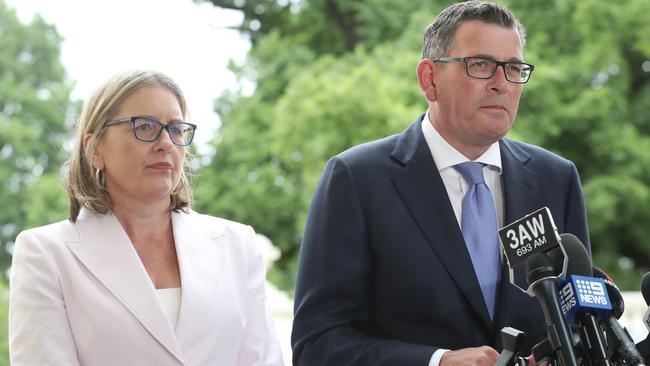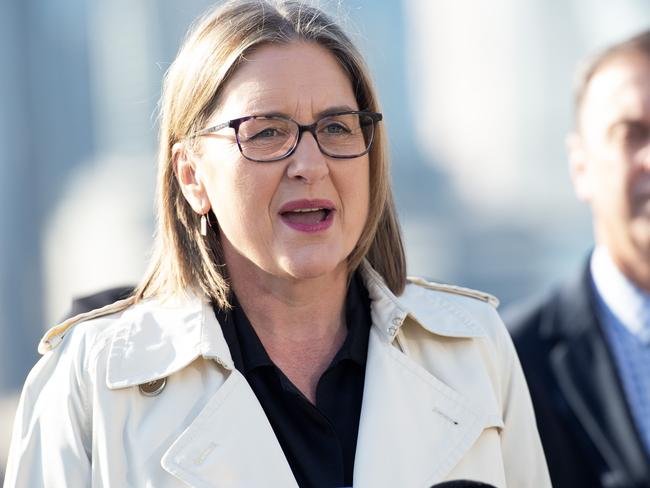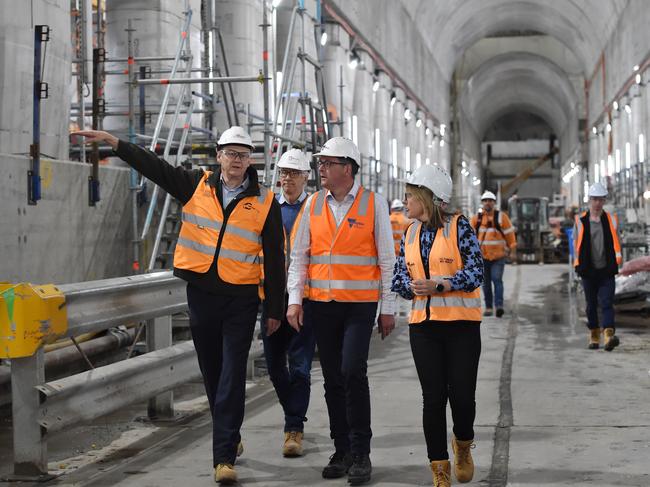Shannon Deery: Jacinta Allan must reset Victoria on a safer fiscal course
Jacinta Allan’s first budget will frame a narrative around her leadership — will she make the first decisive steps to repair her government’s financial credentials or simply continue a decade of increased tax, debt and bureaucracy.

Victoria
Don't miss out on the headlines from Victoria. Followed categories will be added to My News.
Budget day – the first budget under Jacinta Allan’s watch will frame a crucial narrative around her new administration.
Will she make the first decisive steps needed to repair her cash-starved government’s financial credentials? Or will she simply continue a decade of increased tax, debt and bureaucracy and cement in voters’ minds the well-worn trope that Labor can’t manage money?
Victoria is on track to hit $178bn of net debt by 2026-27, an eye-watering figure that will account for more than a quarter of our total economy.
To put that into context, during the post-Cain-Kirner recession, debt as a percentage of GSP (gross state product) peaked at 16 per cent in 1993.
Tax revenue has almost doubled since Labor came to power in 2014, as has the government’s wages bill.
Last year the government recorded a $10.3bn deficit – and warned of more ahead – but promised to return to an operating surplus of $1.1bn in 2025-26.
If that comes to pass, the next surplus will land just as voters are asked to hand Allan another term, Labor’s fourth in succession, at the next election.
She goes into the budget a fiscal blank canvas so the next two budgets, and perceptions within the electorate, ahead of 2026 will be shaped by this one.

She might have been deputy to Daniel Andrews, and personally responsible for a raft of billion-dollar cost blowouts across the state’s major projects, however pollsters report early qualitative research shows voters are not blaming Allan for Victoria’s money problems.
Rather, they think she deserves time to sort it out.
But it’s not just voters Allan needs to be mindful of. Credit agencies are watching carefully for some strong fiscal discipline.
Which prompts the question: is Allan the one to bring it?
She has promised a “sensible and disciplined” budget that will be firmly focused on Victorian families.
“It’s a budget that’s been challenging to put together … in a domestic and global environment which faces many, many pressures,” the Premier said on Monday.
“These are challenges we can’t ignore. We simply can’t put our head in the sand.”
The budget, as much of Allan’s reign, will draw inevitable comparisons with Joan Kirner who inherited an economic mess from John Cain.
Like now, Kirner too battled massive debt, soaring interest rates and crippling budget deficits.
She was ultimately booted from government having been judged as economically inept.
Critically, Kirner did put her head in the sand, resisting spending cuts despite coming under intense political pressure. She insisted the government would not shirk its responsibility to voters and would not hack into services simply to achieve lower spending. Noble, but utterly unrealistic as she came to find out.
In her promise of a “sensible and disciplined” budget, Allan is flagging a different approach.
But the proof will be in the pudding.

If Allan is to arrest Victoria’s spiralling debt and deficit crisis, she can raise taxes, cut spending or do a combination of both.
Raising taxes amid a cost-of-living crisis will be as popular as cutting funding to already overstretched services.
Allan could cut the $125bn Suburban Rail Loop project and immediately free up billions of dollars. That’s incredibly unlikely, given she’s repeatedly on record saying killing SRL is simply not up for negotiation.
“To not build the Suburban Rail would be just accepting that our roads are going to be congested in the years to come,” she said in December.
“It’s accepting that you’re going to be stuck in congestion. It’s accepting that people don’t get to choose the uni or TAFE they want to go to because they can’t get there on public transport. It’s accepting an inequality of opportunity. Yeah, it’s a big project. But we have to build it because otherwise, our current hub and spoke rail network will not serve a growing city.”
Credit agencies expect debt to rise further on the back of the government’s stubborn commitment to infrastructure spending.
That will in turn put pressure on the state’s credit rating.
The latest state budget update showed infrastructure investment would grow to an average $21.3bn a year over the budget and forward estimates. That’s up from $19.6bn in the 2023-24 budget based on North East Link project blowouts.
The fall of the Kirner government on the back of economic ineptitude prompted Labor to design a new blueprint for financial management.
It promised to control debt, spending and taxes and maintain healthy surpluses. It was an approach maintained through the Bracks and Brumby governments and the early Andrews administration.
In her first budget, Allan needs to steer the ship back towards those financial management principles.
There was little effort to rein in spending in last year’s budget, with Daniel Andrews perhaps more focused on his impending departure.
If Allan wants to truly show she’s cut from a different cloth, now is her chance.



